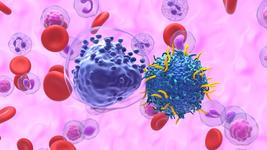Locus Biosciences Shares Positive Phase 2 Data for CRISPR-Edited Phage Treatment for Urinary Tract Infections
CMN Intelligence - The World’s Most Comprehensive Intelligence Platform for CRISPR-Genomic Medicine and Gene-Editing Clinical Development
Providing market intelligence, data infrastructure, analytics, and reporting services for the global gene-editing sector. Read more...
Urinary tract infection (UTI) is one of the most common infectious diseases and is estimated to affect about 150 million people per year globally. More than half of all women and about one-eight of all men experience a UTI during their lifetime, resulting in a global financial burden of approximately $6 billion each year.
While bacterial species from several families can cause UTI, E. coli is by far the main culprit, causing about 80 % of all UTIs. This includes difficult-to-treat and recurrent infections (which occur in 40 % of cases) that are resistant to commonly used antibiotics.
Novel phage therapies to tackle the deadliest antibiotic-resistant infections
To address the urgent public health threat caused by antibiotic- and multidrug-resistant infections, Locus Biosciences is developing novel CRISPR-edited phage therapies targeting four bacterial species of major concern: E. coli, Pseudomonas aeruginosa, Staphylococcus aureus and Klebsiella pneumoniae.
LBP-EC01, which is being developed to treat UTIs, is the most advanced programme in Locus' pipeline and is being evaluated in the ongoing registration-enabling Phase 2/3 ELIMINATE trial.
Specifically, LBP-EC01 is a CRISPR-engineered phage cocktail designed to treat acute uncomplicated UTIs caused by MDR E. coli. Previous approaches to phage therapy have typically relied on either the natural lytic activity of a phage to kill pathogenic bacteria, or the replacement of phage genes with, e.g., a CRISPR construct designed to kill target bacteria. Locus Biosciences has taken a unique approach with LBP-EC01, which works via a novel dual mechanism of action, utilising the natural lytic activity of the phage and the DNA-targeting activity of CRISPR-Cas3. The candidate previously met all primary and secondary endpoints and demonstrated safety and tolerability in a Phase 1b trial.
LBP-EC01 meets pharmacokinetic and safety endpoints in Part 1 of Phase 2 trial
The most recent data for LBP-EC01, published in The Lancet Infectious Diseases, revealed that LBP-EC01 met the primary and secondary endpoints in the first portion of the ongoing randomised, uncontrolled, open-label ELIMINATE trial.
In that part of the trial, 39 adult female patients were enroled across six clinical centres in the US. Eligible participants were aged between 18 years and 70 years, female by self-identification, and had an uncomplicated UTI at the time of enrolment as well as a history of at least one drug-resistant UTI caused by E coli within the 12 months before enrolment. LBP-EC01 was administered as plaque forming units (PFU) via the intraurethral route (IU, via catheter) and intravenously (IV), in combination with oral trimethoprim–sulfamethoxazole (TMP–SMX), which is the standard antibiotic treatment for UTIs.
The overall objective was to define a dosing regimen for LBP-EC01 and TMP-SMX to facilitate progression to Part 2 of the trial. The primary and secondary outcome measures were assessed on randomised patients who received at least one dose of LBP-EC01, and included pharmacokinetics in urine and blood, and safety, respectively. An exploratory outcome of pharmacodynamic assessments was also performed on 16 evaluable patients.
The study led to the identification of a dosing regimen that was well-tolerated and which led to high drug exposure at the site of infection. Based on these data, a regimen of LBP-EC01 given for 2 days IU (2×1012 PFU/dose) and given concurrently for 3 days IV (1×1010 PFU/dose) with concomitant oral TMP-SMX (160 mg TMP/800 mg SMX twice daily) has been advanced into Part 2 of the ELIMINATE trial.
With regards to safety, no serious adverse events were observed in Part 1, and exposure to LBP-EC01 did not lead to any observations of genetic resistance in any subsequently recovered E. coli samples. Following non-serious adverse events of mild tachycardia and afebrile chills in three patients who received a high IV dose in the initial treatment groups, dosing was adjusted to a short, 3-day course of IU and lower exposure IV dosing. In the adjusted treatment groups, rapid reduction of E. coli in urine was observed four hours after the first treatment which was maintained to the day 10 test of cure evaluation. All 16 patients in the evaluable population had complete resolution of UTI symptoms and 14 of 16 patients demonstrated microbiologic cure or reduction of their bacterial infection below 1×103 colony forming units/mL in urine by the day 10 test of cure evaluation.
According to a press release published by Locus Biosciences, patient dosing is underway in Part 2 of the ELIMINATE trial. This randomised, controlled, double-blind portion of the trial will evaluate the efficacy, safety, tolerability, and pharmacokinetics of LBP-EC01 with TMP-SMX. Up to 288 female uncomplicated UTI patients will be enroled and randomised in a 1:1 ratio where patients will receive LBP-EC01 or placebo for the 3-day dosing regimen selected from Part 1. The primary objective will be to evaluate the effect of LBP-EC01 given with TMP-SMX on its ability to treat acute UTIs in patients with a history of UTI recurrence. The impact of the treatment on reducing UTI recurrence and/or extending the duration of time to the next UTI recurrence will be examined as an exploratory endpoint in a 6-month follow-up evaluation.
Stay tuned for more updates
We will continue to update you on the gene-editing clinical trials as new details emerge. In the meantime, can find all of our coverage on clinical-stage gene editing programmes here.
For a complete overview of current gene editing clinical trials, check out CRISPR Medicine News' Clinical Trials Database.
**CRISPRMED25 - The 2nd CRISPR Medicine Conference, Copenhagen, Denmark, April 7-11, 2025**
Learn about the latest discoveries in CRISPR Medicine at the CRISPRMED25 Conference in Copenhagen, Denmark, April 7-11, 2025.
Tags
ArticleNewsClinical News UpdatescrPhageE. coli infectionsInfectious diseaseUrinary Tract Infections, UTICas3LOCUS Biosciences, Inc.
CLINICAL TRIALS
Sponsors:
Base Therapeutics (Shanghai) Co., Ltd.
Sponsors:
Base Therapeutics (Shanghai) Co., Ltd.







